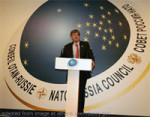Russia invites its NATO partners to attend security conference in Moscow

BRUSSELS. March 19 (Interfax) – Russian officials said on Monday at a meeting of the Russia-NATO Council that Russia intended to hold an international conference on military and political aspects of European security in Moscow on May 23-24, Sergei Koshelev, director of the Russian Defense Ministry’s department for international military cooperation, said.
Russian Defense Minister Sergei Shoigu has proposed holding the conference and Russian President Vladimir Putin has approved, Koshelev.
“The reason to hold such a conference is certain stagnation in solving the problems of the European security. This issue has been discussed for years, arguments have been going on for years, who are Russia and NATO today – partners, rivals or companions? NATO members said at a summit in Chicago that at least we were not enemies, that we had considerable common interests,” Koshelev said.
“Yes, indeed we agree with this,” Koshelev said. “There are many problems on which we cooperate with NATO. I can give examples of the fight against piracy, the initiative on air cooperation, we hold successful talks on logistics support cooperation and we cooperate in the fight against terrorism,” he said.
Koshelev said that on the other hand, there “are currently serious spheres in which we do not agree.” “The most fundamental of them is of course the missile shield, where no progress has been made for a long time,” he said.
The state of ordinary forces in Europe with considerable advantage of NATO members’ forces over Russian forces raises the question against whom these forces are aimed, Koshelev said.
It is planned to consider “what the military and political situation in today’s Europe is, what problems European forces are solving to ensure security in Europe and what threats currently exist” from the point of view of military experts, Koshelev said.
Koshelev said that armed forces of key countries, like Germany, France, UK, Italy and Russia, were currently undergoing a profound transformation. “What is the goal of this? What for do we train our forces? For what threats? Against whom are we going to fight with military means in the future?” he said.
The Moscow conference could have tried to answer these questions, Koshelev said. Conference organizers assume that European countries have more common threats, which are easier to fight together. “We could have at least set a vector for future cooperation to do this,” he said.
The second major topic of the conference is the situation in Central Asia after the withdrawal of the International Security Assistance Force from Afghanistan. “This issue is currently discussed in almost all contacts between military leaders of Russia and NATO,” Koshelev said.
Military authorities of NATO members realize that the situation in Central Asia could deteriorate after the withdrawal of the international coalition force from Afghanistan.
“So we would like to provide the ground to discuss this situation and possible cooperation between rapid reaction forces of the Collective Security Treaty Organization (CSTO) and NATO,” Koshelev said.
The CSTO force will be the one to ensure security in Central Asia after 2014, Koshelev said.
“Of course, we cannot leave out the missile shield issue, which will be discussed during the Moscow conference,” Koshelev said.
Koshelev said that invitations had been sent to NATO General Secretary, all NATO defense ministers, heads of the Organization for Security and Cooperation in Europe, military attaches of relevant countries accredited in Moscow, experts of Russian and foreign political centers and non-governmental organizations specializing in European security.
Koshelev met NATO Cooperation and Regional Security Director Carlos Branco in Brussels on Monday. The two discussed the conference on the European security in Moscow. Branco said that the Russian proposal was “a very serious invitation to dialog.”
